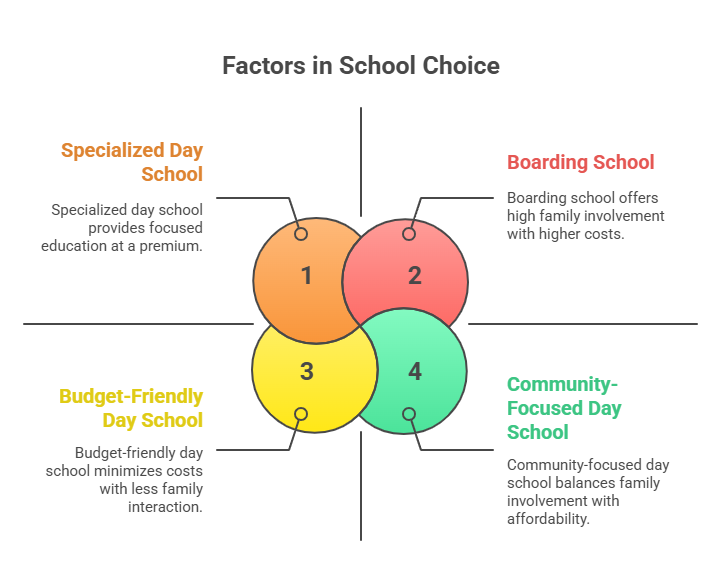KeyHighlights About Day schools Vs Boarding Schools
- This guide offers a clear, side-by-side look at Day Schools vs Boarding Schools in Toronto, featuring standout institutions like USCA Academy, Branksome Hall, and Upper Canada College.
- It helps parents consider key factors such as the child’s personality, family lifestyle, academic goals, and budget to figure out which school type might be the right match.
- Real insights from a parent and student are included, giving a personal touch to how families actually make these decisions.
- For international families, the article highlights why schools like USCA Academy are a trusted choice, offering strong academics along with supportive environments that keep families involved.
Introduction
Choosing a school for your child isn’t just about academics; it’s about the kind of life experience you want them to have. In a vibrant city like Toronto, parents are faced with two distinct paths: day schools, where students go home each evening, or boarding schools, where education and daily life intertwine. Each has its strengths, challenges, and appeal. So, how do you decide?
This guide breaks it all down for you, from the practical to the emotional, so you can choose what fits your family’s needs best.
What Are Day Schools and Boarding Schools?
Day schools are just what they sound like. Your child attends classes during the day and comes home after school. They wake up in their own bed, eat breakfast at the family table, and end the day with you. It’s the kind of structure most families know and trust.
Boarding schools, on the flip side, are a whole different rhythm. Students live on campus with their peers and follow a full-time schedule of academics, extracurriculars, meals, and supervised downtime. These schools are designed to be self-contained environments where students grow, not just academically, but personally and socially.
There’s no universal “better” option. The real question is: What kind of experience do you want for your child?
Day Schools vs Boarding Schools in Toronto : A Quick Comparison
To help you see the bigger picture, here’s a comparison of some top schools in Toronto, highlighting whether they’re day or boarding institutions, what they focus on, and why families choose them.
| School Name | Type | Key Factors Considered | Standout Features |
| USCA Academy | Day School | University pathway, affordability, small classes | Offers OSSD, AP programs, top choice for international students; highly trusted by parents |
| Branksome Hall | Day & Boarding | IB curriculum, global focus | All-girls IB World School with exchange programs and state-of-the-art facilities |
| Upper Canada College | Day & Boarding | Academic prestige, alumni network | Historic all-boys school, strong leadership development and IB diploma offering |
| St. Michael’s College | Day School | Catholic values, sports programs | All-boys school, known for academics and hockey excellence |
| Bishop Strachan School | Boarding | Girls’ leadership, residential life | Boarding option for girls, nurturing environment, high university acceptance rate |
| Havergal College | Day & Boarding | Academic rigor, arts & leadership | Girls’ school with strong emphasis on leadership and character development |
| Appleby College | Day & Boarding | Global education, experiential learning | Highly respected, emphasis on service learning, outdoor education |
This table gives clarity, but your decision should always come down to your child’s personality, goals, and where they’ll thrive.
Factors to Consider When Choosing Between Day and Boarding

Let’s get honest, this isn’t just about reputation or rankings. There are many moving parts in this decision.
Your Child’s Personality
Is your child independent, adventurous, and eager for new experiences? Boarding might be the spark they need. Are they more comforted by routine and home support? A day school could be a better fit.
Family Lifestyle and Commitments
If your family travels frequently or works long hours, a boarding school’s structure can provide consistency. But if your family life centers around dinner table conversations and weekend soccer matches, staying local makes more sense.
Academic and Extracurricular Needs
Boarding schools often have more extended hours and greater access to facilities. Day schools, especially like USCA Academy, offer focused pathways like AP and University Prep, ideal for students targeting specific post-secondary goals.
Budget Considerations
Boarding comes with added costs such as residence, meals, and round-the-clock supervision. Day schools tend to be more budget-friendly without compromising educational quality.
At the end of the day, it’s about alignment. What aligns with your child’s needs and your family’s vision?
Parental Perspectives: What Do Families Prefer?
Ask five parents, and you’ll get five different answers, and that’s okay. Some prioritize academic rigor above all. Others want their children to grow into confident, independent adults through real-world living at a boarding school.
For many families in Ontario, especially those new to Canada, USCA Academy stands out as a trusted day school option. Why? Because it balances academic excellence with strong personal support. The school is especially known for working closely with international students and helping them adjust, thrive, and transition to Canadian universities.
Whether you’re an involved parent who wants daily check-ins or someone who values structured independence, the right school will support, not replace, your parenting approach.
Real-Life Experiences: Student & Alumni Voices
Jaspreet (Current USCA Academy Student):
“As an international student, I was nervous. But USCA made it easier. The teachers are always available, and I love that I still get to live with my family while studying toward university in Canada.”
Liam (Parent of a USCA Academy Student):
“We considered both. But honestly, my son wasn’t ready to leave home. Day school was the perfect middle ground. He’s excelling academically, and we’re still part of his daily life.”
These stories highlight what no brochure can: how a school fits into someone’s real journey.
Final Thoughts: Which School is Right for Your Child?
It’s not about choosing the “best” school on paper. It’s about choosing the best fit for your child and your family.
If your child is ready to leap into independence, surrounded by diverse peers and packed schedules, a boarding school can be transformative. But if you value a strong home presence and hands-on parental support, day schools like USCA Academy offer just as much opportunity, minus the homesickness.
You know your child better than anyone. Use that insight. Visit campuses. Talk to counselors. Ask the hard questions.
And remember, this isn’t a one-size-fits-all journey. It’s a personal path, and there’s no wrong turn when you’re informed and intentional.
Frequently Asked Questions About Day Schools vs Boarding Schools in Toronto
1. Can students switch from day school to boarding school (or vice versa) mid-year in Toronto?
It’s uncommon, but possible with administrative approval. The transition may be smoother if both options exist within the same institution (like Branksome Hall or Appleby College). Families should consult school counselors early and consider the student’s adaptability.
2. How do schools handle cultural diversity and language barriers for international students?
Schools like USCA Academy have dedicated ESL programs, cultural integration workshops, and staff fluent in multiple languages to ensure a supportive environment. Some even pair new students with cultural mentors to ease the transition.
3. Is the curriculum different in day and boarding schools in Toronto?
The core curriculum remains consistent across both types, especially for schools offering Ontario Secondary School Diploma (OSSD). However, boarding schools often provide additional enrichment opportunities like extended STEM labs, leadership modules, and evening academic support that day schools may not offer.
4. Can parents stay involved if their child attends a boarding school?
Definitely. Many schools encourage parent engagement through video conferencing, online grade portals, newsletters, and scheduled visit days. Some even assign a liaison or mentor to update parents regularly on academic and emotional progress.
5. What’s the typical teacher-to-student ratio in day vs. boarding schools?
While it varies by institution, boarding schools often boast lower ratios (like 1:8 or 1:10) due to smaller class sizes and additional faculty supervision in dorm settings. Premium day schools may also offer similar ratios, especially in higher grades.








